Despite the comfortable lead of Chancellor Angela Merkel’s Christian Democratic Union (CDU) and its sister party, the Christian Socialist Union (CSU), in polls, Germany, as well as the EU, would never be the same again after upcoming German election on September 24. Merkel is on the course to pursue her fourth, and the last term, as the Chancellor. Her party is unlikely to form a government without forming coalition other party(ies). While the Grand Coalition (CDU/CSU+SPD as the junior partner), just like the one we have had since 2013 and between 2005-2009, is the most favorable to the economy and the financial markets, it cannot be seen as a done deal. Meanwhile, rising supports for the populist Alternative for Germany (AfD) signal that a far-right party would enter the parliament for the first time since WWII. AfD has pledged to promote its anti-EU and anti-immigrants rhetoric in the parliament as it might probably become the biggest opposition party in case of a Grand Coalition. Moreover, the parliament is prone to be more fragmented with six parties in 2017-term, compared with four previously. This article aims to prepare investors in interpreting the election results. Beginning with the reasons for Merkel’s apparent lead, we would take a look at how different coalition combinations would affect EU integration. We would also see how AfD might slow the progress of integration, despite its limited number of seats in the parliament.
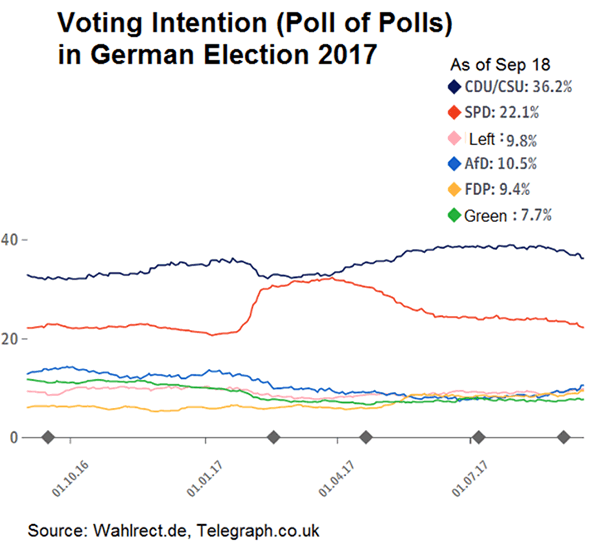
Why Merkel?
Merkel’s popularity hinges on the strong economic performance of Germany, German people generally feel good about the country, both in economic and political terms. Pew Research’s survey reveals that 86% of the interviewees believe their economy is doing well, up from 75% last year, thanks to the quick recovery from the global financial crisis.
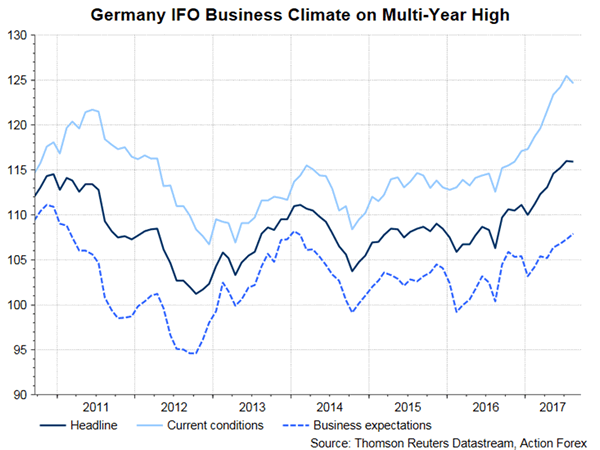
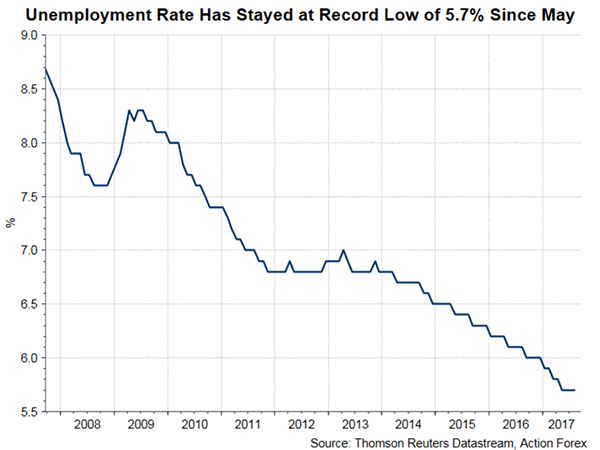
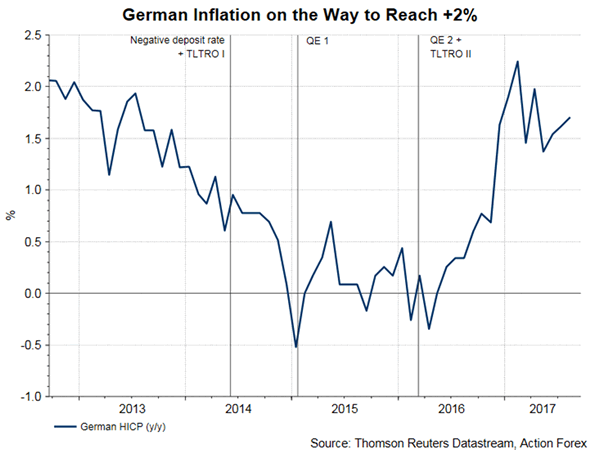
The survey also shows that 58% has a favorable opinion of the center-right CDU, although that for centre-left SPD is 68%. Meanwhile, 81% of the interviewees "feel good" about Merkel’s capacity "to do the right thing on the world stage". Indeed, she has been nicknamed "mutti" (meaning "mother" in German) as she is like a kind mother of the nation. Despite a short-term decline in popularity after the temporary open-door policy for Syrian refugees in 2015, the tensions were eased quickly as she promised it would not repeat.
German people are more risk-averse, when compared to the US and other European countries. It is evidenced by the country’s low debt-to-GDP ratio and the huge surplus figures. This trait probably led to the fact that two of the most longest-serving leaders in post-war Europe were from Germany. This has also anchored their support for Merkel who has served as the Chancellor since 2005. Maintaining the status quo, meaning unchanged economic policies, together with prudent increase spending and tax cut, and conditional progress in EU integration, is probably the safest choice. .
Possible Coalitions
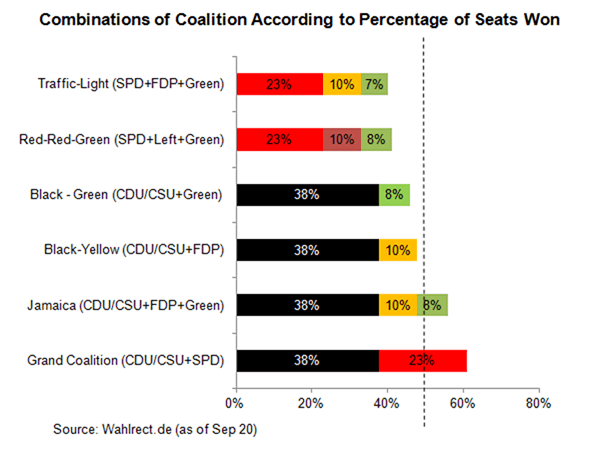
Grand Coalition
According to current polls on two combinations – Grand Coalition and Jamaica, are possible. CDU/CSU would be able to secure about 38% of the seats in the Parliament. However, it remains short of the 50% threshold for the formation of a majority government. Therefore, CDU/CSU would have to form an alliance with other parties. A Grand Coalition would likely be the most positive for the market. This combination does not only brings the least uncertainty, but also allows polices to be implemented in a smooth manner. The parties share similar views on a wide range of policy issues.
Both parties propose to increase government spending and cut tax. Yet, they might diff in how to carry out. While CDU/CSU favors to increase child allowance, SPD opts for higher spending on education and publish infrastructure. While CDU/CSU proposes to reduce income tax by 15B euro over 4 year and phase out reunification surcharge from 2020, SPD proposes to cut tax (worth of 10B euro) for small and medium group but raise for high income group (annual income over 76 200 euro).The details can be negotiated. The most important is that both parties are thinking in the same direction.
Both parties would endeavor on deeper EU integration. While SPD has indicated preference to transform the European Stability Mechanism (ESM) to a European Monetary Fund (EMF) for cross border investment and counter-cyclical spending, but not euro bonds, CDU/CSU might agree on the EMF so as to incentivize further reform. The SPD favors creating a common financial budget (to enable investment and stabilising mechanism in crises) and establish a euro area economic government. This might go too far for CDU/CSU. Yet, CDU/CSU might consider depending on size and purpose. On taxation, while CDU/CSU seeks to reduce and harmonise corporation taxes with France, the SPD goes further to harmonise the taxation across Europe and fight tax evasion
Both parties support the idea of European Defense Union and European Army, complementary to NATO. However, while CDU/CSU supports increasing defense spending to 2% of GDP by 2024, SPD has complained this requirement by NATO as unnecessary and unrealistic.
However, one should not see this as a done deal!
SPD has attributed its decline in popularity to the coalition government since 2013. However, its leader Martin Schulz has not refused to confirm that there will not be a re-run, though. Meanwhile, CDU/CSU has expressed its concerns that the SPD has not ruled out the possibility of forming coalition of the Left Party, descendents of the former dictatorship of communist East Germany. Merkel has long announced that she would not work with the Left and AfD to form government.
Indeed, CDU/CSU’s most preferred partner is the liberal Free Democratic Party (FDP), as the parties have similar views on a number of policy issues, ranging from property tax reduction to continuation of labor leasing, from an increase in military spending to sponsorship of projects against right-wing extremism, etc. However, polls suggest that the Black-Yellow coalition won’t have sufficient seats to form a government.
Jamaica
As mentioned previously, CDU/CSU would choose to work to FDP if they can pass 50% together. Polls suggest that this could happen if the Green Party is included. However, it is not easy for FDP and Greens, the historical rivals, to work together. The parties are divided in a number of issues, from economics to environment. Jamaica coalition might indeed drag the progress of EU integration.
While CDU/CSU and FDP have more common views, FDP and Greens are divided in several aspects. For instance, FDP is in support of fiscal discipline and economic reform. It also proposes to strengthen the no-bailout clause and sovereign insolvency procedures and proposes to create exit procedures from EMU. By contrast, Greens opposes austerity measures. It suggests that Europe of different speeds should be an option. These differences also mark their opposing views on the creation of a common EU budget.
On the domestic issues, FDP proposes a cut of 30B euro in tax and social contribution, while Greens introduces tax on the "super-rich". Meanwhile, FDP proposes to increase government spending on education, while Greens favors more expense of R&P and environmental protection. Contrary to both CDU/CSU and FDP, Greens rejects to increase defense spending to2% of GDP.
AfD
While unlikely to be part of the establishment, it might be the largest opposition party if there is a re-run of the current coalition. The far-right, populist party would then chair the parliament budget committee and open debate during budget consultation. AfD has pledged to use the parliamentary speeches to spread its anti-immigrants and anti EU ideas. Its founder Alexander Gualand has noted that his party would call for a committee to investigate Merkel on her "policy of bringing 1 million people into this country" and she should be "punished for that". AfD is prone to increase the difficulty of passing any legislation particularly related to EU integration.
While, in first sight, the German parliamentary election appears to be a boring game with Merkel certain to be the Chancellor for a fourth term, a number of tweaks might the final outcome surprising. The predictability of opinion polls might have diminished this time, as almost 50% of the German voters are "undecided", the most in two decades. We believe the market has fully priced in CDU/CSU’s victory and Merkel’s Chancellorship. It might have mostly priced in another term of Grand Coalition. Therefore, the outcome of a re-run might only have mildly positive impact, if any, on the European stock markets and the euro. Other outcomes should be more negative. The more seats AfD get would be more negative to the single currency.
